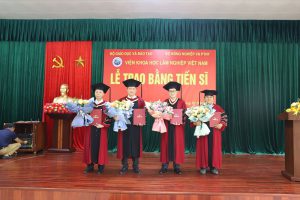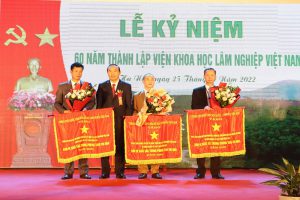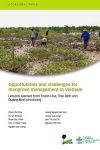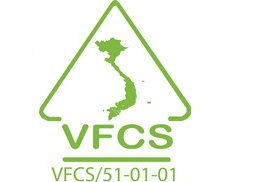PART I. ACHIEVEMENTS, POSITIVES AND NEGATIVES
Achievements:
· The Prime Minister announced the creation of the Vietnamese Academy of Forest Science by upgrading the status of the Forest Science Institute of Vietnam,
· Implementation a new five year plan for the period of 2011-2015,
· Seventh year FSIV has successfully tendered for the establishment and implementation of scientific and technological forestry projects and being awarded 12 national and ministry projects,
· FSIV is managed by one Director General, four Deputy Directors General, three functional divisions, six research divisions, 14 research and technology transfer centers and one sub-institute, and
· FSIV has 581 staff of which 462 are permanent staff and 127 are contracted staff. Staff includes five Associate Professors, one Doctor of Science, 25 Doctors of Philosophy, 132 Masters, 263 Engineers/Bachelors of Science, and 156 technicians and workers.
Positives:
· FSIV received praise and effective advice and direction from leaders and departments of Ministry of Agriculture and Rural Development and other relevant agencies, and
· FSIV staff are highly qualified and experienced scientists, who take a very enthusiastic and proactive approach to their research. As a consequence, FSIV has been awarded a large number of projects and programs for implementation, monitoring and evaluation.
Negatives:
· Adverse climatic conditions created difficulties for the establishment of some field experiments, · While research activities of FSIV have been implemented across the country, the number of staff employed in the functional divisions was reduced, causing difficulties in monitoring and evaluation of some research projects, and· Project budgets were reduced by 10% as a result of externally applied budget savings and together with higher labor and inputs costs, added additional difficulties in implementing programs. The Institute only received funding to implement one of the four basic construction projects approved.
PART 2. TASKS UNDERTKEN IN 2011
In 2011, FSIV implemented 90 scientific, technological and environmental tasks at ministry and national level, with a total value of more than 34,976 billion VND; 12 forest tree breeding projects and several forest extension and forest development contracts with a combined value of 8,432 billion VND; Four equipment and tool strengthening projects with a combined value of 9,807 billion VND; Two basic construction projects with the value of 4,215 billion VND; Three small construction and big maintenance projects with the value of 967 million VND; 17 international projects/contracts with a combined value of 11,766 billion VND; Post-graduate training of 45 PhD candidates with a value of 314 million VND, and Over 131 contracts for scientific services and commercial production with a combined value of 74,448 billion VND.
The total budget FSIV for 2011 was 164,724 billion VND. However, following savings of 1,970 billion VND (Resolution 11), the total expenditure on budgeted items was 162,754 billion VND; and increase of 6% higher on the 2010 year (154,557 billion VND).
PART 3. ACHIEVEMENTS
Scientific, technological and environmental tasks
As mentioned above, in 2011, FSIV implemented nine tasks at the national level, 52 tasks at the ministry level and 32 tasks at the unit level. Of the scientific, technological and environment tasks, 38% accounted for 51% of the total budget implemented by the relevant Hanoi units of FSIV with the rest undertaken Research Centres and the Sub-Institute. Among 90 scientific, technological and enviromntal tasks, 33 tasked were completed in 2011, and 67 tasks will be ongoing in 2012. The main achievments for 2011 were:
Forest tree breeding and forest bio-technology
· MARD approved distribution of four advanced tree varieties of Macadamia integrifolia,
· Completion of technical procedures to rapidly propagate Acacia hybrid clones, BV10, BV16, BV32, BV71, BV73, and BV75, using tissue culture,
· Determined the genetic variability of Acacia mangium in Tuyen Quang and Phu Tho, and of A. cassicarpa in Quang Tri and Thua Thien Hue,
· Developed and maintained a total area of approximately 1,000 ha existing seed forests, newly converted seed forests, seed orchards, parent tree orchards and tree improvement trials. Species include Pinus, Acacia, Eucalyptus, native forest timber species, non-timber native forest species and species suitable for rehabilitating sand and coastal areas,
· Provided high quality breeding material for the establishment of parent tree gardens using propagation techniques for species such as Acacia and Eucalyptus,
· Technology transfer of propagation techniques using tissue culture or cuttings supplied to provincial departments, several commercial nurseries and forest enterprises. Establishment rates using these advanced varieties and technologies has reached 60%,
· Selected plus trees propagated by cutting or tissue culture for Acacia hybrid, A. mangium, A. crassicarpa, A. auriculiformis, E. camaldulensis and E. pelita,
· Eucalyptus hybrid propagated by cutting technique for Dipterocarpus alatus, Hopea odorata, Coscinium fenestratum, Moringa oleifera, Camellia lutescens,
· Used molecule indicators RAPD and cpADN to analyze the inter-relationships for several species, · Developed and established trials for several clones using crossings within and between species for Acacia and Eucalyptus,
· Separated ADN from genes and developed gene multiplication reaction with corresponding material of gene npt II, gus and cry 1Ab, and received signal line of corresponding ADN,
· Completed technical procedures to create new genetic lines using mature embryos,;
· Created new genetic lines using soma embryo and gene transfer techniques to embryogenic tissues of P. kesiia,· Crossed several lines ofE. camaldulensis and separated ADN from 500 seedlings to run the SSR/RAPD reaction test for the development of tolerance to leave dot disease (Cryptosporiopsis eucalypti) in E. camaldulensis using molecule indicators,
· Selected six varieties of symbiotic root fungus AM from forest trees and identified the genetic status of fungal Ri-DNA for transfer to host trees, and
· Developed means for transferring the sybiotic root fungus, AM, to host trees using compressed gel tablets.
Silviculture
Forest planting techniques
· Determined silvical characteristics of Knema pierrei, Dipterocarpus grandiflorus, Petrocarpus macrocarpus.
· Determined silvical characteristics of Azadirachta exselsa and selected 60 plus trees for genetic improvement of this species.
· Developed a site classification system to determine appropriate planting conditions and establishment techniques for Dipterocarpus alatus, Hopea odorata, Brownlowia tabularis, Alnus nepalensis, Neolamarkia cadamba, Lithocarpus issus.
· Developed techniques to modify plantation forests of Pinus merkusii, Pinus massoniana in the Central of North Viet Namto better approximate native forests of Erythrophleum fordii, Lithocarpus issus, Cinnamomum parthenoxylum, Lithocarpus ducampii;
· Developed techniques to convert Pinus kesiya forest in the Central Highlands to approximate native forests of Fokienia hodginsii, Calocedrus macrolepis, Lithocarpus annamensis, Lithocarpus chinaensis, Paramichelia baillinii, Melia azedarach, and
· Determined techniques to maintain and improve site productivity of Eucalyptus and Acacia through a number of rotations.
Silvicultural methodology for natural forets
· Established, collected data and commenced preliminary analysis of 74 permanent plots located in four main forest types:
Salt-swamp tropical evergreen broad-leaved forest,
Tropical evergreen broad-leaved forest,
Tropical semi-deciduous broad-leaved forest (Khộp forest), and
Alum-swamp tropical rain evergreen broad-leaved forest.
· Provided preliminary data as the bases for recommendations for the sustainable management and harvesting of these four natural forest types in Viet Nam,
· Developed statistical functions for measuring carbon sequestration of evergreen and semi deciduous and deciduous forests in the Central Highlands,
· Determined the silvical characteristics and requirements for the establishment of plantations of Lithocarpus bacgiangensis in Bac Giang Province and developed technology transfer models to assist local people apply the recommended methods, and
· Identified 400 tree species as a reference set for the Mui Ca Mau National Park, U Minh Ha and the island group of Hon Khoai.
Forest ecology and environment
· Developed technical procedures and software for greenhouse gas monitoring, quantified emissions from managed peat lands and developed a methodology for decreasing greenhouse gas emissions in forestry as part of Climate Change studies,
· Built a forest ecological map of Vietnam showing the potential impacts of various climate change scenarios on various ecological zones for the period of 2011-2020 showing predicted changes in the natural distributions of ecosystems and assessed the potential impact on several natural forest ecosystems (tropical evergreen broad-leaved forest, tropical evergreen broad-leaved forest, tropical semi-deciduous broad-leaved forest, and alum-swamp tropical rain evergreen broad-leaved forest). In addition, a set of criteria has been developed for planting the main forest species, allowing for predicted climate change effects,
· Developed criteria and a hazard classification system for the planting of mangrove forest in the northern coastal provinces,
· Assessed the status, direct consumption and Carbon sequestration values of tidal influenced forests and the protection values of wind prevention and sand prevention forests, and
· Identified the silvical characteristics and factors affecting the creation of intact mangrove forests growing on sand, gravel and coral soil in Con Dao Province for Rhizophora mucronata, Rhizophora stylosa, Rhizophora apiculata, Ceriops decandra and Dioscorea pentaphylla.
Non-timber forest products
· Identification and classification of 26 fungal species, of which 24 species were recorded for the first time in Vietnam,
· Isolation of 243 samples of fungus Cordyceps militaris and developed procedures to culture Cordyceps militaris. The anti-carcinogen, cordycepin, was isolated from Cordyceps militaris, with concentrations of more than 1.52%,
· Determined the establishment and management protocols for the growing and harvesting of Michelia hypolampra,
· Determined the distribution and ecology of Melanorrhoea laccifera and selected 60 plus trees for further studies on form and breeding,
· Developed the establishment requirements and processes for growing Sinocalamus flagellifera,· Identification of several Ratan species of high quality and productivity for commercial production in Hoa Binh Province,
· Development of establishment techniques to Michelia mediocris, Aleurites molucana, Aquilaria spp, Toxicodendron succedanea, Moringa oleifera, Herba jinqiancao, Coscinium fenestratum, Amomum longiligulare,
· Developed an understanding of the cause and effect of degradation of Dendrocalamus membranaceus forest and developed criteria for classifying the degraded forest. Restoration is possible using several native species Erythrophleum fordii, Lithocarpus issus, Cinnamomum parthenoxylum, Acacia hybrid,
· Description of the physical and chemical characteristics such of trans-anethol oil extracted from Illicium verum, and
· Development of practical procedures to extract oil from Illicium verum using firewood or coal. Forest protection and management
· Identification of seven insect species which attack the foliage of A. auriculiformis and A. mangium in Quang Tri Province and documentation of insect ecology and biology together with physical, biological and chemical control methodologies,
· Selection of 70 P. merkusii trees tolerant to pine caterpillar in Thanh Hoa and Ha Tinh Provinces,· Documentation of the biological and ecological characteristics of excrescence bee, the cause of damage to Eucalyptus in Quang Ninh and Binh Dinh Provinces,
· Identification of 26 species (11 genus of 2 families of termites belonging to the Termidae and Rhinotermitidae families). Three species, Microtermes pakistanicus, Macrotermes annandaleiand Macrotermes barneyicause extensive damage to hybrid Acacia and Eucalyptus urophylla,
· Establishment of a trial to evaluate ten products for the control of termites in hybrid Acacia and Eucalyptus urophylla. The chemicals, Lenfos 50EC, Mapsedan 48EC, Termidor 25EC and 02 products DIMEZ and Metavita 90EC, effectively controlled termites in hybrid Acacia and Eucalyptus urophylla plantations. Subsequently, protocols have been developed for safe and effective control of termites, and
· Assessment of the status of invasive plants in several protected areas and the development of potential control measures.
Forest Industry
Forest mechanization
· Determination of light levels, temperature and air humidity suitable for raising cuttings of Acacia hybrid, E. urophylla, Terminalia chebula, Calocedrus macrolepisunder different climatic conditions. Protocols also developed for automatic shade control and water application under nursery conditions.
Forest product processing
· Continuation of research on the:
· microscopic structure of 360 species,
· physical, mechanical and chemical properties 835 tree species in Vietnam, and
· structure, physical, mechanical and chemical properties of Dendrocalamus giganteus and Cephalostachyum sp,
· Improvements in the kiln drying of bamboo for shutter production and other products using bamboo sawdust, · Determination of schedules for the production of charcoal from sawdust,
· Designing and manufacturing of equipment for screening sawdust in the manufacture of pressed charcoal pellets, · Identification of potential species to produce red, black, indigo, yellow and brown coloured dyes for dying of cloth by ethnic minorities in Dac Lac Province, and
· Surveyed 120 wood processing enterprises across the country to aid in the development for planning future wood processing industry development in Vietnam.
Forest product preservation
· Development of technologies and procedures to process and preserve rattan, to treat the waste water environment after preservation process and, in collaboration with rattan manufacture unit in Cho Moi, Bac Kan Province, to develop models for the transfer of technology to local forest owners,
· Determination of procedures for the preservation of Pinus massoniana wood using the chemical of LN5,· Determination of the chemical formula and schedule to obtain change colour of P. massoniana wood using a fungus and the impact of fungus treatment on mechanical and physical properties and colour of the wood and development of models for technology transfer of this research in Lang Son Province,
· Completion of technology to produce a wood preservative using from chemicals extracted from the cashew nut shells, and
· Development of technologies and prescriptions for the treatment of forest plantation timbers using a Silicon and Boron based compounds. Outcome being the protection of Styrax tonkinensis and hybrid Acacia from termites and fungi.
Forestry-related Economics and Policy
· Quantification of the potential wood product market for plantation grown forest products and factors affecting markets in main economic-ecological zones including the organization and location wood processing infrastructure, their scale and technology, market demand and trends,
· Assessment of the costs and benefits of plantation forestry at the family scale in Yen Bai and Quang Ninh Provinces,
· Development of new economic models for the rejuvenation of forest enterprises in Vietnam, and· Comparison of the financial status of state forest enterprises since 1999 and proposed models for the rejuvenation of these enterprises in Quang Ninh Province.
International cooperation
During 2011, FSIV implemented 17 international tasks with the value of 11,776 billion VND. The main tasks included:
· Finalizing of strategy “Action Plan for the Forestry Research” with its subsequent approval by MARD,· Development of optimal silviculture management regimes for plantation forests, including their management and the control of forest pests and diseases,
· Selection and development of tropical Acacia hybrids using diverse genes and biotechnology within forest tree improvement breeding program,
· Establishing a database for REDD implementation,
· Validating the area and extent of plantation and mangrove forests in Viet Nam,
· Developing land use systems to mitigate deforestation and further degradation of already degraded forests,
· Integration of suitable land uses in tropical rainforest areas to decrease Carbon concentration,
· Identifying the causes and impacts of forest degradation and demonstrating suitable forest rehabilitation techniques for Vietnam,
· Documenting criteria for classifying forest ecological zones, and
· Evaluating the impacts and mitigation strategies for climate change. These collaborative international tasks have been progressed and completed in a timely manner, meeting donor approval.FSIV hosted more than 50 international experts/delegations during the year and two international volunteers commenced working within the Institute. FSIV also organized a large number of scientific lectures, workshops and meetings across Vietnam and has arranged for many staff to attend international meetings, workshops, conferences and training courses. International professional development of staff is a key strength of FSIV and currently there are 14 Doctoral candidates studying in The Netherlands, China, Australia and Sweden and seven Masters candidates studying in the United States, South Korea and Australia.
Postgraduate Training
A total of five Doctoral degrees were conferred on FSIV staff during 2011. The status of other Doctoral candidates is that seven have completed their research subjects, 15 have successfully defended their research at local academic committees and three have successfully defended their research in front of national/institutional committees. To maintain a stream of Doctoral candidates, during 2011, ten new Doctoral candidates were assessed by the FSIV Academic Examination Board (and MARD) and were approved as meeting the standards for entry into the Doctor of Philosophy program.In addition to internal training, 15 FSIV staff taught/lectured at other training institutions while also supervising students from other academic institutions including candidates for Bachelor degrees (ten), Master degrees (50) and Doctoral degrees (19). FSIV staff also gave professional lectures to undergraduate and postgraduate students at the Forestry University of Vietnam, the Thai Nguyen Forestry Agriculture University, and the Tay Nguyen University. Staff also organized many short training courses for researchers, workers, farmers in different fields.
Data and information
An important function of FSIV is to publish its research findings in a national and international context, especially for the results to be adopted by forestry practitioners.
To this end FSIV published four editions of the Vietnam Journal of Forest Science.
FSIV also published 12 books and published 52 scientific articles in domestic journals. In addition staff presented one paper at an international conference and 66 papers at domestic conferences. FSIV celebrated its 50th Anniversary in 2011 and published several books: The Forest Science Institute of Vietnam – Establishment and Development Progress, The Forest Science Institute of Vietnam: 50 years of building and development (1961-2011), Forest science and technology research result period 2006-2010, Forest tree introduction period 2000-2010, and PhD science research result – Volume VI.
Also to celebrate the 50th Anniversary, FSIV produced 80 posters and one documentary highlighting the scientific and technological achievements of FSIV since its establishment in 1961.Together with MARD, FSIV will collaborate in producing a new book, Vietnam Forestry, to promote the advancement of forestry in the country, especially in the first decades of the 21st century. It is essential for forestry research to be translated into practical terms through technology transfer. Together with VTC Channel 16, FSIV was able to introduce new techniques for the production of seedlings and plants and how to process and preserve forest products for farmers. The technical procedures included the propagation and planting of A. hybird, A. auriculiformis, E. hybrid, E. urophylla, P. caribaea, Erythro phleum fordii and Michelia mediocris under Pinus forest,Macadamia integrifolia, Garcinia cowa, Amomum xanthioides, Camellia, Bambusa burmanica, Cinnamomum balansae,processing of Melaleuca wood, preservation of bamboo, rattan and timber and the protection of construction timbers from termites. FSIV also collaborated with Vietnam TV to introduce and transfer scientific advice and results to other local people including ethnic minorities. FSIV participated in several conferences:
· The First Forest Product Festival held in Binh Dinh introducing FSIV’s recent scientific achievements,
· Conference on Science and Technology Assessment for the period of 2006-2010 held at MARD, and
· Conference on Science and Technology held by the Ministry of Science and Technology in Lai Chau.Another way FSIV promotes its results is through the internet. FSIV maintains its own website (http://www.fsiv.org.vn/) which contains a wide range of information on forestry and forestry related issues in Vietnam.
Summary
· Following the Prime Minister’s announcement, FSIV is being elevated in status to the Vietnamese Academy of Forest Science,
· 90 scientific, technical and environmental tasks were completed with a budget of 34,976 billion VND,
· Four advanced varieties ofMacadamia integrifolia were approved by MARD,
· Awarded 12 scientific, technical and environmental tasks commissioned by the Ministry,
· Implemented 131 contracts of technical services and trade with the value of 74,448 billion VND, and
· Meet all administrative requirements in an increasingly budget constrained environment.In conclusion, FSIV is proud of its achievements and results for the year 2011. They provide an ongoing basis for continued high quality forestry research and development in an era when FSIV transforms into the Vietnamese Academy of Forest Science.
PART IV: MOVING FORWARD TO IMPLEMENT TASKS IN 2012
Personnel organization
Following the Prime Minister’s announcement of the upgrade to the Vietnamese Academy of Forest Science, FSIV is completing a new organizational structure which will include Institutes, Centres and Boards prior submission to MARD for confirmation.
Planning for new scientific and technical projects
· Continue implementing the current projects in 2012,
· Implement high quality science to meet the various new scientific, technical and environment tasks set for 2012,
· Develop new project proposals for funding,
· Continue the organizing scientific workshops, mid-term and final workshops for projects and organizing consultation workshops to comment on new projects for 2012, and
· Strengthen the consultation, monitoring and evaluation of FSIV, the centres and the research divisions to continuously improve the quality of results for the many projects implemented by FSIV for MARD and other clients.
International Co-operation
· Propose and introduce management principles for implementation of international tasks, and
· Strengthen the cooperation with international institutions and research partners in research, development and technology transfer, combining collaboration with international academic and training agencies for professional development and language.
Postgreaduate training
· Strengthen the collaboration between FSIV and other research, education and training institutions, and
· Develop training programs for research staff, particularly for post-graduate training in the research divisions and to strengthen the monitoring and promotion of Doctoral candidates to implement projects and theses following the approved schedules, and improve the quality of these theses.
Data and information FSIV will strengthen its promotion of the institute, its activities and achievements by:
· Improving the FSIV website with updated information and research findings,
· Strengthening the e-database of plant resources and research results,
· Increasing the quality and quantity of Vietnam Journal of Forest Science,
· Collaborating with VTC16 to produce further technical guidelines for plant breeding, plant production, product processing and preservation of forest products for farmers,
· Publishing a book introducing new and advanced techniques for technology transfer for commercial production, and
· Preparing and organizating the forest science and technology conference in Central Vietnam.
Financing
· Continued improvement of the knowledge and skills of staff including emphasis on upgrading of monitoring and evaluation skills processes for all projects implemented at FSIV.
Latest news
- Project: "Research on improving the economic efficiency of plantation timber value chains, meeting legal timber requirements and sustainable forest management"
- Project: Commercial-scale yield trial and completion of planting techniques for newly recognized acacia hybrid cultivars (BV586, BV376, BB055, BV584, BV523, BV434, BV350)
- Project: Study on technology of producing hollow veneer-based composite used in construction and interior wooden furniture
- VFCS is published on the website of the Forestry Department, Ministry of Agriculture, Forestry and Fisheries of Japan
- Memorandum of Understanding signing ceremony on handing over new wood material samples from the Finnish Embassy to the VAFS for displaying






